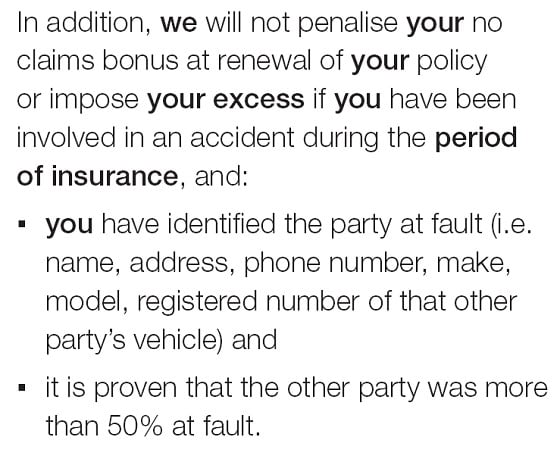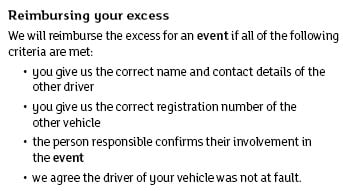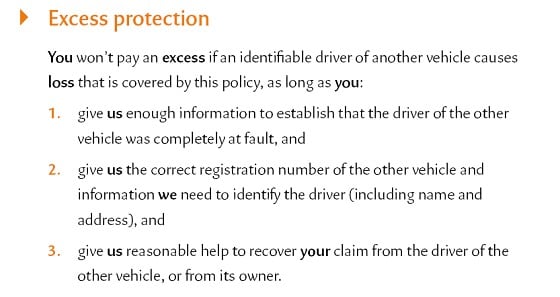|
|
|
Jase2985:TonyR1973:Jase2985: because you as the insured party is still liable for the excess until the insurance company can catch up with the UTP and confirm they accept responsibility for the accident. Then the insurance company chases the UTP for the money.
No. Comprehensive policies do not rely on the acceptance of responsibility by a UTP - they rely only on your insurer's view as to responsibility and confirmation that the other party was involved in the event, which they can deny whether insured or not.
sorry but in my experience, which in the last 2 years has been 3 claims due to other peoples in not at fault accidents, we are still liable for the excess until the other party accepts responsibility for the accident. fortunate for us a simple call to the other party was able to clear this up and our excess was waived. If it went into a situation where they said it wasnt their fault we would still have to pay the excess to get the car fixed, and if down the track the UTP was found to be at fault then we would get the excess refunded.




Jase2985: This can and does result in a heap of wasted time, extra stress, and potentially extra cost in proving fault in an accident. if people had insurance its a lot simpler for the people involved as the insurance companies generally sort it out.
Jase2985: you sound like you are responsible and if you were to have an accident you would be able to deal with it with out to many issues. but others this is not the case, and if they have an accident would struggle to deal with it let alone pay for repairing the other car involved.
jarledb:TonyR1973:
Just where do you get off attempting to label people who don't shirk their personal responsibilities by hiding behind big corporations primarily to minimise their exposure to their own negligent actions "irresponsible", anyway?
The thing is, you have to be incredibly rich to be able to not skirt your responsibility if you are actually going to be able to pay up for any damage you make when driving around uninsured.
TonyR1973:
I suggest you should read your policy closely and hold your insurer to it in future. I went into bat for a mate who had an identified UTP hit his vehicle and they wanted him to pay an excess too. He's a bit weak so he did even when I'd pointed out he'd done all that was required for it to be waived according to his policy (you can lead a horse to water, as the saying goes).
Here's the relevant sections from Tower, AA, State and Youi policy documents (not in that order).
TonyR1973:jarledb:TonyR1973:
Just where do you get off attempting to label people who don't shirk their personal responsibilities by hiding behind big corporations primarily to minimise their exposure to their own negligent actions "irresponsible", anyway?
The thing is, you have to be incredibly rich to be able to not skirt your responsibility if you are actually going to be able to pay up for any damage you make when driving around uninsured.
Incredibly rich? I don't think so, considering the average age and value of the NZ vehicle fleet.
Matthew
Jase2985:TonyR1973:
I suggest you should read your policy closely and hold your insurer to it in future. I went into bat for a mate who had an identified UTP hit his vehicle and they wanted him to pay an excess too. He's a bit weak so he did even when I'd pointed out he'd done all that was required for it to be waived according to his policy (you can lead a horse to water, as the saying goes).
Here's the relevant sections from Tower, AA, State and Youi policy documents (not in that order).
it may vert well say that in the policy, but in my actual experience, they only wave your excess once the other party admits fault. most clear cut cases are sorted out in the first claim phone call as they call the other party to establish fault .If its one of those situations that they dispute whats happened then you are still liable for the excess up until the point where the insurance companies sort it out.
Jase2985: you generally pay the excess to the repairer when you pick the car up, so by the time you make the claim, have the car viewed by the panel beater, then the assessor, then have it fixed, the insurance company has more than likely sorted things already. so you don't have to pay a thing.
Jase2985: how many claims have you had to make? are you basing your comments on recent experience or ....?
RUKI:TonyR1973:jarledb:TonyR1973:
Just where do you get off attempting to label people who don't shirk their personal responsibilities by hiding behind big corporations primarily to minimise their exposure to their own negligent actions "irresponsible", anyway?
The thing is, you have to be incredibly rich to be able to not skirt your responsibility if you are actually going to be able to pay up for any damage you make when driving around uninsured.
Incredibly rich? I don't think so, considering the average age and value of the NZ vehicle fleet.
Think about this practical example:
I drive daily my small little old Toyota which may be of not a big value as you rightfully pointed out about NZ vehicle Fleet, but I consider it is mandatory to have 3-rd party insurance.
It is the area where I drive it = the centre of car dealership in Greenlane where I daily see people with lack of driving skills (my two-way dash cam sees and records that now and then) getting on the Gr South Rd for the test drive of Jaguars, Volvos, Suzuki, etc. The price of those cars starts from $20K and goes up to over $150K.
The least thing one would like to be involved in - is arguing who was at fault, making a snob to admit they were and/or paying for someone elses wrong doing.
Different story if you live in the woods, the rare car you see around is farmer's 20 year old rusty car leftovers and the only thing you could possibly bump in is possum ...
mdooher: Back in the late 80's I had a colleague who was driving his car (yes semi legally) on an airport apron. He managed to hit the landing gear of quite a large aircraft.... he sure as hell was pleased he had 3rd party insurance.
MikeB4: I believe insurance should be mandatory in order to drive, that does not imply compulsion as driving cars is not compulsory.
MikeB4: I also believe it should be mandatory that any work done on vehicles concerning safety and structural integrity etc should be carried out only by appropriately certified personnel and the work certified and those certifications carried with the vehicle at all times.
TonyR1973:MikeB4: I believe insurance should be mandatory in order to drive, that does not imply compulsion as driving cars is not compulsory.
The question is how would it affect you if it was compulsory to have motor vehicle insurance as opposed to the current situation? Aside, of course, from the obvious premium fleecing you'd be getting.
Compulsion to do something is still compulsion regardless of whether the underlying reason for that compulsion is optional. It's not compulsory to have an income, but if you choose to it's compulsory to account for it and to pay tax according to the rules.MikeB4: I also believe it should be mandatory that any work done on vehicles concerning safety and structural integrity etc should be carried out only by appropriately certified personnel and the work certified and those certifications carried with the vehicle at all times.
That's nice. Having experts deciding what's good and what's not certainly helped prevent the leaky homes which had occurred many times previously when amateurs were allowed to build their own homes. Oh, wait...
I equate positions such as yours with turkeys voting for an early Thanksgiving.
garyasta: My apologies to all previous posters for not reading all the emails on this topic, as there are many varied responses. I would like to make a personal observation.
I've been in the States a few times, as well as UK, Aussie, Japan and Indonesia (these two don't really count, as the people numbers make cars less of a problem), Rarotonga, Tonga, Vanuatu, Mexico.... I think that's about it, and my feelings are that we are the worst drivers in the world (at least the bits I've seen).
I don't think that the numbers of cruisers per head of population has that great an influence on the attitude of drivers on the road. I think that what happens when you are caught breaking the "understood" rules, influences how we drive.
Without going into the rules and processing of each and all countries, i would venture to say that the proverbial "wet bus ticket" attitude by police and courts with regard to misdemeanors of a certain standard (and upwards) in New Zealand leads to a "what the hell" attitude.
If each and every drinking, or drugged, driver spent a few nights in the cells even before sentencing, we might see a change in attitude. Speeding over a certain limit should also have similar penalties.
Many is the time I read of drinking drivers having received a number of convictions without spending any time in the lockup. They are potential murderers of our friends and families and continue to drive on the expectation that they won't get caught or have to pay with their freedom.
I would vote for a more rigid form of sentencing.

Geektastic: Repeat offenders should see their cars impounded and sold off, their licences cancelled and have to begin the entire licensing process again as if they were 16.
|
|
|
